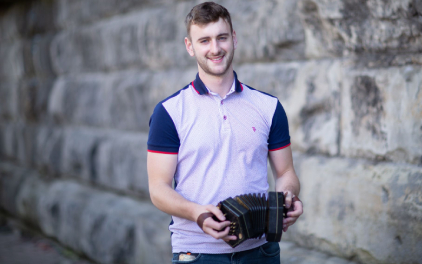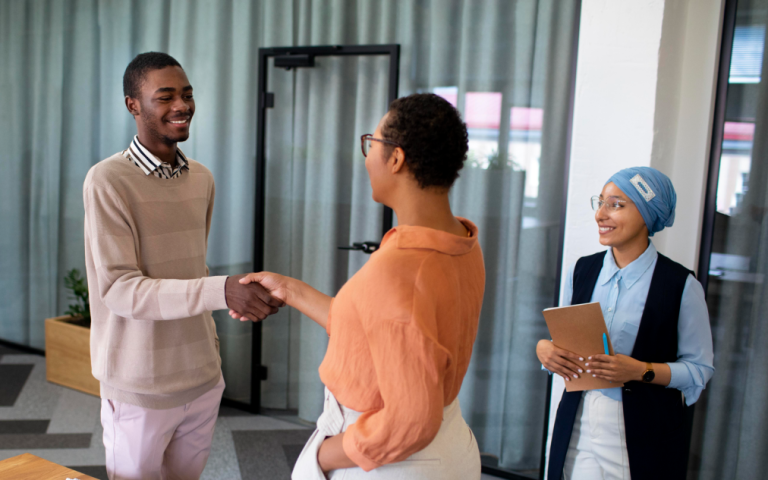Conor O’Loughlin is a concertina player from Corofin in County Clare. He has been playing since he was 8 years old and has won a host of prizes both individually and with bands at All-Ireland Fleadhs over the years.
Born into a musical family in Ireland’s musical heartlands, Conor also has a passion for passing on the tradition and teaches concertina with Music Generation, an organisation committed to providing accessible music education to children around the country.
Conor directed his passions for both music and teaching into the Concertina Courses which he has produced for Alison.
Hi Conor, tell us a bit about yourself!
My name is Conor O’Loughlin. I’m 23 and I’m from a small village in County Clare called Corofin. There’s a lot of music around the area. Corofin is steeped in traditional music going back generations and the next small village is Kilfenora, which is famous for the Kilfenora Céilí Band. When I was 6, I started learning the tin whistle first and then began playing the concertina when I was 8. I’ve been playing it ever since.
How did you get into Irish traditional music?
There’s a lot music in my family. My mother plays the button accordion and my two brothers play the flute and banjo. My cousins play as well and probably my first experience of hearing the concertina was from my cousin. I just loved the sound of it and was naturally drawn to it. As kids we were given the option of choosing what instrument we wanted to pick and so I picked the concertina.
I studied with Noel Hill for about a year and a half and then I went to Tim Collins, a Limerick concertina player based in Clare. I started entering Fleadhs, both solo and with different bands and groups, and did very well up through the age groups.
How did your relationship with music change as you got older?
After my Leaving Cert, I wanted to continue with music so I studied traditional music in the University of LImerick. There were auditions because it’s a performance-based course and so you had to have music going into it. You play everyday and you have a tutor for your first instrument. Obviously my first instrument was the concertina but there were lots of other with various first instruments. They have state of the art facilities in UL, with a specific building for music called the Irish World Academy of Music and Dance.
The course I was doing was called Irish Music and Dance, so we focused on those subjects but the topics we studied branched out to things like jazz theory, the background behind music, and how it’s linked to education and therapy. Performance-wise it was strictly Irish music, but music-wise generally, it was quite broad.
Tell us about your experience teaching with Music Generation.
Music Generation was set up by U2 and it’s an organisation that believes that every child, no matter what the circumstances, should have the opportunity to experience and learn music. It started in Dublin and it has now spread country-wide. Nearly every county has a Music Generation programme.
I’ve been teaching with them for a year now. This year, we got funding for a concertina orchestra – 44 children between the ages of 10 and 18, all playing concertinas. They had to audition for it and there was music written specifically for them. We recorded a concert in Glór Theatre in Ennis in April and that premiered online earlier this month.
Can you give us a bit of background on the concertina in Ireland?
The concertina is a German instrument and the story goes that it was brought over to Ireland by cargo ships coming over from Germany and got dropped off in Shannon some time in the nineteenth century. County Clare has always been renowned for concertina players, and music generally. There had been great players down the years like Elizabeth Crotty and Chris Droney, who only died last year.
The father figure with regards to our generation of concertina players is Noel Hill. He really re-energised and reinvented the playing of concertina music. Since him, then there’s been a flurry of great concertina players. When I was competing in Fleadhs, there was nearly 40 competing in the Clare Fleadh alone and the standard was out of this world.
What is it that you love about the concertina?
There’s so much you can do on the concertina. With say the flute, for example, you can only play the melody or the harmony. Whereas with the concertina you can add chording. A chord is when you play two or more notes at the same time and by doing that you can actually accompany yourself using chords. I talk about that in the course. The concertina isn’t an easy instrument to learn but it’s very satisfying when you get to the point of being able to play a tune and add chords to it.
What is it about Irish music that makes it so appealing?
It’s such a big community and yet so small – every body knows each other and it’s very close-knit. At traditional festivals, no matter where you go in the country, you’re going to know somebody. You also have a great opportunity to go travelling. When I was studying in Limerick, I was in a band and we travelled the States and Europe. We were in the States twice, travelling and playing festivals and organised gigs. And then when covid started, we were actually in Austria. We just got back before things went into lockdown!
Why would you recommend learning Irish music to people?
Irish music is extremely social and you get to meet so many people. Traditional music is also based around improvisation. When I go and play a session, I may have a completely different version of a tune from the person next to me, so we improvise and work around each other. So you form friendships very easily through music. It’s a hobby after all so, at a session, you’ve a similar interest to the person sitting beside you playing.








